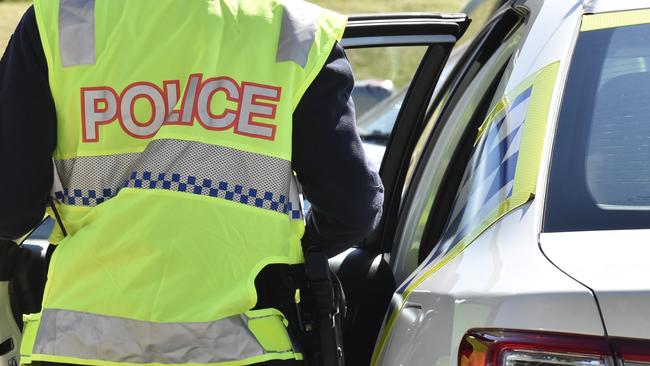Accused crims raking in thousands from sloppy police work
Missing witnesses, delays and statements riddled with hearsay - serious flaws have been revealed after a year-long investigation into police prosecutions in Queensland. Accused criminals are walking free, with taxpayers coughing up for their costs.
Police & Courts
Don't miss out on the headlines from Police & Courts. Followed categories will be added to My News.
ACCUSED criminals are walking from court with thousands of dollars in taxpayer-funded costs awarded over bungled police prosecutions and “fatal flaws” in briefs of evidence.
The sloppy police prosecutions can be revealed after an almost year-long freedom of information battle for internal reports detailing cases where courts have awarded costs against the police.
They expose a series of flaws that have toppled prosecutions, ranging from missing witnesses and “significant” delays in the prosecution case to statements riddled with “hearsay”.
Gaps in some cases are only discovered by notoriously overworked police prosecutors on the eve of hearings or summary trials, forcing charges to be dropped to avoid even bigger costs.
Police yesterday defended the cost orders, saying criminal cases had “complex and variable aspects”.
The department initially refused to release the internal reports to The Courier-Mail under Right to Information laws in May 2019, only handing them over 11 months later after an appeal by the newspaper.
The reports detail 15 cases where court costs were awarded to the defendants in Queensland magistrates courts over five months to May 2019, totalling a combined $35,375 in costs.
One of those involved alleged gang member Harley Joe Barbaro, 27 – a member of the notorious Barbaro crime family and brother of slain Sydney underworld boss Pasquale Barbaro.
He was awarded $4500 in court costs over a technicality about whether he was served a proper “official warning” notice against consorting with 15 known offenders.
It is understood the reports are only generated in cases where court costs are awarded against police, meaning the bulk of unsuccessful police prosecutions are not afforded the same scrutiny.
Costs are only awarded against police in the state’s magistrates courts, where most criminal and traffic prosecutions are heard summarily and handled by about 331 Police Prosecution Services staff.
That comprises 80 legal officers, 251 sworn officers and more than 50 administrative staff.
The courts must identify shortcomings in the police investigation where matters are dismissed due to insufficient evidence in order to award costs under Queensland law.
In one case, a defendant accused of handing fraudulent scripts to a chemist received $750 after being mistakenly arrested following a mix-up over his notice to appear, with the charges later dropped at summary trial in the Brisbane Magistrates Court.
By the time the case landed on a prosecutor’s desk, however, it was “immediately apparent that the evidence was insufficient to secure a finding of guilt”.
Statements had not been obtained from the pharmacies involved and one of the witness statements was “riddled with inadmissable hearsay”.
Defence lawyers applied for $2000 in costs, but the prosecution argued that was “artificially high” as it had taken just 15 minutes to identify “fatal deficiencies” in the brief of evidence.
Another defendant charged with assault was awarded $6000 in May 2019 after a not-guilty verdict in the Brisbane Magistrates Court following “substantial delays” between charges being laid and a notice to appear being issued, resulting in a witness being lost.
Another defendant, this time in the Southport Magistrates Court in January 2019, was awarded $4125 in court costs after being found not guilty of an obstruct police charge.
In that case, police witnesses provided “identical cut and paste paragraphs in the statements... however neither admitted they had provided their statement to the other under cross examination”.

A month later, $3700 in costs were awarded to a defendant over a dropped wilful damage prosecution after Magistrate Annette Hennessy found that the “investigation by police was poor initially, and also was poor after the matter was listed for trial.”
In that case, a new defence witness – who lived across the road from the offence address – gave evidence undermining the prosecution case and it was discontinued.
Police Prosecution sources say an underlying issue was the fixation on police charges and clear-up rates – the percentage of crimes listed as “solved” – rather than court outcomes.
It is understood the crime clear-up rates are not adjusted, regardless of the court result, which receives little attention internally compared to the number of charges laid in official statistics.
Prosecutors also face pressure from arresting officers to continue charges despite major shortcomings in the evidence, and are struggling under the strain of huge workloads, sources say.
Experienced Brisbane criminal lawyer Bill Potts said prosecutors were overworked and did not have enough time to prepare or read cases.
“My personal view is we need more police prosecutors,” he said. “If they were better prepared and had better resources to do these things, then you would expect the weak cases would be winnowed out.
“It’s the witnesses, all the police preparation time, it’s the victims of crime who find themselves let down most of all.”
A police spokesman said some issues were not arising until being dealt with by a prosecutor, or reaching court. He said this occurred particularly when dealing with witness availability, co-operation or credibility, which may not be known at the time of police preparing the brief of evidence.
He said police “continue to review the process and quality of police briefs of evidence, including examining options to facilitate electronic briefs of evidence in the future”.


